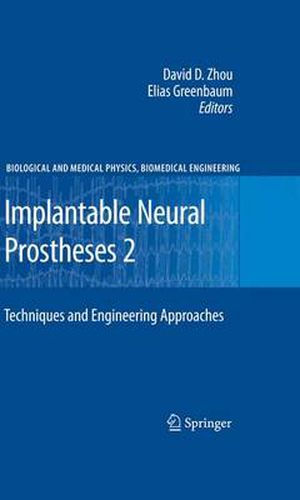Readings Newsletter
Become a Readings Member to make your shopping experience even easier.
Sign in or sign up for free!
You’re not far away from qualifying for FREE standard shipping within Australia
You’ve qualified for FREE standard shipping within Australia
The cart is loading…






This title is printed to order. This book may have been self-published. If so, we cannot guarantee the quality of the content. In the main most books will have gone through the editing process however some may not. We therefore suggest that you be aware of this before ordering this book. If in doubt check either the author or publisher’s details as we are unable to accept any returns unless they are faulty. Please contact us if you have any questions.
Signi?cant progress has been made in the development of neural prostheses for restoration of human functions and improvement of the quality of life. Biomedical engineers and neuroscientists around the world are working to improve the design and performance of existing devices and to develop novel devices for arti?cial vision, arti?cial limbs, and brain-machine interfaces. This book, Implantable Neural Prostheses 2: Techniques and Engineering Approaches, is part two of a two-volume sequence that describes state-of-the-art advances in techniques associated with implantable neural prosthetic devices. The techniques covered include biocompatibility and biostability, hermetic packaging, electrochemical techniques for neural stimulation applications, novel electrode materials and testing, thin-?lm ?exible microelectrode arrays, in situ char- terization of microelectrode arrays, chip-size thin-?lm device encapsulation, microchip-embedded capacitors and microelectronics for recording, stimulation, and wireless telemetry. The design process in the development of medical devices is also discussed. Advances in biomedical engineering, microfabrication technology, and neu- science have led to improved medical-device designs and novel functions. However, many challenges remain. This book focuses on the engineering approaches, R&D advances, and technical challenges of medical implants from an engineering p- spective. We are grateful to leading researchers from academic institutes, national laboratories, as well as design engineers and professionals from the medical device industry who have contributed to the book. Part one of this series covers designs of implantable neural prosthetic devices and their clinical applications.
$9.00 standard shipping within Australia
FREE standard shipping within Australia for orders over $100.00
Express & International shipping calculated at checkout
This title is printed to order. This book may have been self-published. If so, we cannot guarantee the quality of the content. In the main most books will have gone through the editing process however some may not. We therefore suggest that you be aware of this before ordering this book. If in doubt check either the author or publisher’s details as we are unable to accept any returns unless they are faulty. Please contact us if you have any questions.
Signi?cant progress has been made in the development of neural prostheses for restoration of human functions and improvement of the quality of life. Biomedical engineers and neuroscientists around the world are working to improve the design and performance of existing devices and to develop novel devices for arti?cial vision, arti?cial limbs, and brain-machine interfaces. This book, Implantable Neural Prostheses 2: Techniques and Engineering Approaches, is part two of a two-volume sequence that describes state-of-the-art advances in techniques associated with implantable neural prosthetic devices. The techniques covered include biocompatibility and biostability, hermetic packaging, electrochemical techniques for neural stimulation applications, novel electrode materials and testing, thin-?lm ?exible microelectrode arrays, in situ char- terization of microelectrode arrays, chip-size thin-?lm device encapsulation, microchip-embedded capacitors and microelectronics for recording, stimulation, and wireless telemetry. The design process in the development of medical devices is also discussed. Advances in biomedical engineering, microfabrication technology, and neu- science have led to improved medical-device designs and novel functions. However, many challenges remain. This book focuses on the engineering approaches, R&D advances, and technical challenges of medical implants from an engineering p- spective. We are grateful to leading researchers from academic institutes, national laboratories, as well as design engineers and professionals from the medical device industry who have contributed to the book. Part one of this series covers designs of implantable neural prosthetic devices and their clinical applications.